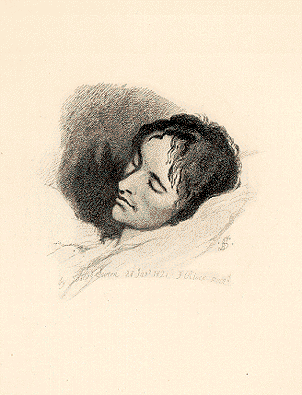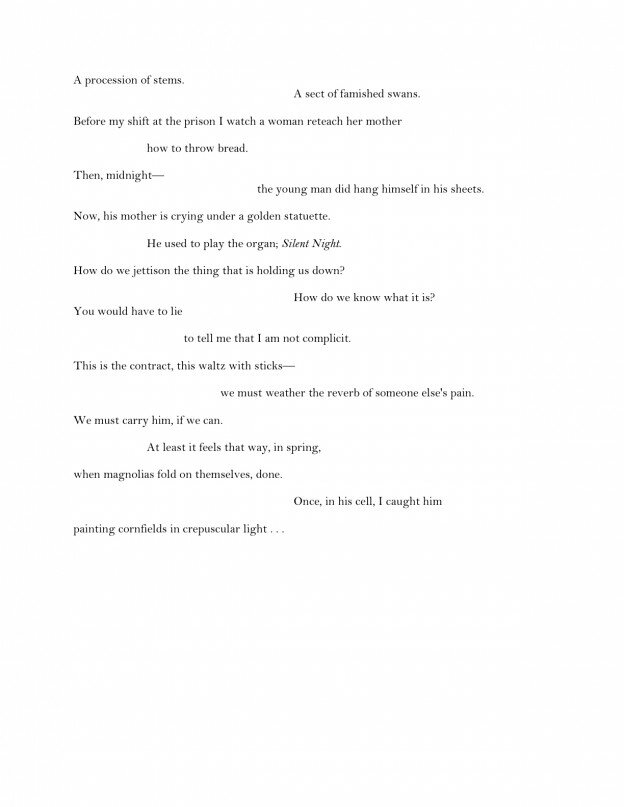I want to do a bit of a meditation on the nature of voice and how the self is written into a poem.
When I first read Augustine’s Confessions, I felt I had discovered one of the hidden hinges of the modern “voice.” I was familiar with classical writing, and the coldness of the speaking voice in classical authors seemed absolutely foreign to me. Perhaps it was the fact that inflected languages do not always use a singular word to express “I.” The “I” in both Greek and Latin is snuck in by sticking an ending on the word, so grammatically the “I” stands out less.
Yet Augustine was radically different. Classicist, film scholar, and popular historian Thomas Cahill articulates it well:
Augustine is the first human being to say “I”–and to mean what we mean today….Open any collection of Great Thoughts or Great Sayings–especially one that, like Bartlett’s, goes in chronological order–and let your eye pick out the I’s. In the oldest literature their paucity and lack of force will begin to impress you. Of course, characters in Homer refer to themselves occasionally as “I.” Socrates even speaks of his daimon, his inner spirit. But personal revelation, such as we are utterly accustomed to, is nowhere to be found. Even lyric poems tend to be objective by our standards, and the exceptons stand out: a fragment (“The moon has set / and the Pleiades: / it is the middle of the night, / and time passes, yes passes– / and I lie alone.”), attributed to Sappho, and the Psalms, attributed to King David.
When in the classical period we reach the first works to be designated as autobiographies, we can only be confounded by their impersonal tone. Marcus Aurelius, by Gibbon’s standards the most enlightened emporer and the great philosopher of Roman antiquity, speaks to us in epigrams, like Confucius and Ecclesiastes before him: “This being of mine, whatever it really is, consists of a little flesh, a little breath, and the part which governs”–he means his mind. This is as confidential as Marcus gets. Or how about this for a personal revelation? “All that is harmony for you, my Universe, is in harmony with me as well. Nothing that comes at the right time for you is too early or too late for me.” For all their ponderousness, the great emperor’s thoughts are never more personal than a Chinese fortune cookie.
It’s immediately clear why Augustine is often seen as the last classical and first medieval man. He marks the ultimate synthesis of classical rhetoric and sensibilities with the concept of self that marked the Judeo-Christian tradition. As Cahill points out, the Psalms stand out among classical literature, as exceptionally personal. Augustine, says Ronald Heine, was “the undisputed master of using the psalms to lay one’s soul bare before God in the praise and confession of prayer….The psalms permeate everything Augustine wrote.” Rowan Williams points out that the very first sentence of Confessions is a quotation from the psalms. Augustine weaves them throughout such that we hardly know when the words are his and when they are not (a modern citation nightmare).
Consider a few selections from the Greek Anthology:
LECTORI SALUTEM
Earlier poets have left full accounts of these matters.
~Strato of Sardis (trans. Dudley Fitts)
And this poem, which is more personal, but even the personal impulse is mediated:
TO HIS MISTRESS
~Asklepiades (trans. Dudley Fitts)
One of the more consistently “personal” poets I have found in the several (meager) collections of Greek Anthology poems is Meleagros:
REDIMICULUM PUELLARUM
~Meleagros (trans. Dudley Fitts)
In addition to Augustine’s unique “I,” I believe that Augustine is relatively unique in his relationship to his audience. His audience is God, the You of Confessions, yet really, we know it’s us. Homer and Virgil invoke the Muse, yet, I don’t get the picture that the Muse is their audience. No, the Muse is there mostly to help them get started. Ultimately, they have some other audience in mind. Augustine, though, intends for us to “overhear” (in the words of John Stuart Mill that Allan Grossman is so fond of citing) his lyrical unbosoming. He wants us to eavesdrop outside the confessional booth.
There is a fascinating double movement going on here. Augustine, himself weaving, imitating, and voicing the psalms, wishes for us to hear, so that we, presumably, can sympathize, but be moved to make our very own confession. Ironically, much of western art has imitated Augustine’s confession. We have a continual chain of imitation that stretches all the way back to one of the Ur-poets of our world: King David (or whoever wrote the psalms).
Yet even the psalms themselves are not single-voiced. Traditionally, it was understood that many voices are encapsulated in the psalms. Early Christians and Jewish interpreters recognized this (though they often disagreed strenuously on who was speaking). Ronald Heine captures the sense that one has while praying through the psalms: “When I read the psalms…alone, sometimes I am instructed or exhorted by the voice of the ancient author as he relates the stories of Israel; sometimes I myself am speaking, addressing God directly in the words of the psalmist; at other times I am directly addressed by God in the words of the psalm. The conversation may move back and forth within a single psalm.” When you add to this the layer of “inspiration,” and all the accompanying debates about it, it becomes clear that any attempt to unthread the twisted ball of connections will be completely futile.
So we have before us what seems like a contradiction, a swirl of voices that somehow manages to lay bare the angst of the single person. Toward the end of my time at Hunter, coming up on what I felt was a dry period in my writing, I decided to try and rewrite various psalms. was the first. When picking a psalm, one is immediately confronted with the difficulty of various voices. I was used to creating an overall emotional sense in my poems, something that was difficult with multiple voices. Psalm 39, however, was relatively uniform in its voice (or at least it seemed to me at that time).
This is how my poem came out:
Moth (Psalm 39)
Wanting to avoid your violent side, I tried to keep
my mouth shut when I saw the way you
rigged this game to destroy beauty—
and not just beauty, but the gaudy,
fast food smut that I hoard, too—
always savored by the hungry
moth. But you always hated the grudging
“Yes.” You made me broach the issue
of how you snatch away another’s beauty
in gloating silence, leave us bleached,
belly up, whales on the sand’s ecru:
Not even a bone to gnaw at when I’m hungry?
It’s either you or vanity, vanity…
So, you have my yes. True,
this might have been the point: your beauty
is a bitter sponge of lye you lift up daily
to my mouth, while I am consumed
by the blows of your hand, our beauty
—yours, mine—a moth, feeding, still hungry.
As you can see, it’s a villanelle built around two ending words (rather than lines): beauty and hunger. It became clear very quickly, though, that I would not be able to encompass all the ideas in the poem. Like Augustine, I was chopping and using what I could to fit into my own voice. But such decisions are hard to make. The psalms are often so layered with meaning and reference that it feels violent to cut any part while still doing justice to the psalm as a whole. In this case, the form worked as a way that dictated what to include and what to “evict” from Psalm 39: what worked went in.
Later, at Tom Sleigh’s recommendation, I picked up Donal Davie’s , which, as fortune would have it, also included an adaptation of Psalm 39. Davie, you can see, is considerably less angsty.
The Thirty-ninth Psalm, Adapted
Donald Davie
I said to myself: “That’s enough.
Your life-style is no model.
Keep quiet about it, and while
you’re about it, be less overt.”
I held my tongue, I said nothing;
no, not comfortable words.
“Writing block”, it’s called;
very discomfiting.
Not that I had no feelings.
I was in a feever.
And while I seethed,
abruptly I found myself speaking:
“Lord, let me know my end,
and how long I have to live;
let me be sure
how long I have to live.
One-finger you poured me;
what does it matter to you
to know my age last birthday?
Nobody’s life has purpose.
Something is casting a shadow
on everything we do;
and in that shadow nothing,
nothing at all, comes true.
(We make a million, maybe;
and who, not nobody but
who, gets to enjoy it?)
Now, what’s left to be hoped for?
Hope has to be fixed on you.
Excuse me my comforting words
in a tabloid column for crazies.
I held my tongue, and also
I discontinued my journals.
(They accumulated; who
in any event would read them?)
Now give me a chance. I am
burned up enough at your pleasure.
It is all very well, we deserve it.
But shelved, not even with mothballs?
Hear my prayer, O Lord,
and please to consider my calling:
it commits me to squawking
and running off at the mouth.”







